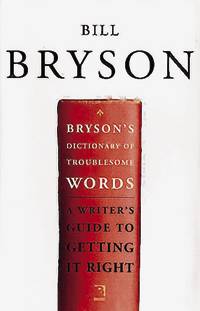
 |
| Click here to buy this book from amazon.com |
"When I split an infinitive,'' Raymond Chandler once declared, "I split it so it stays split.''
As the hard-boiled author of The Big Sleep and other detective classics, Chandler brushed off nit-picking copy editors like gnats, but the rest of us, whether professional writers or casual scribblers, live in constant grammatical anxiety.
And the publishing industry knows it, filling yards of bookstore shelves with style manuals dispensing solemn advice on the distinction between imply and infer, the proper use of fulsome and decimate, and, of course, the propriety of beginning sentences with and.
The big guns in the style-manual field, such as H.W. Fowler's A Dictionary of Modern English Usage, have tended toward the encyclopedic, laying down the law on matters ranging from the logic of the phrase from whence to the proper pronunciation of margarine.
A visit to the newsroom of any newspaper, however, is likely to turn up a slimmer sort of style guide devoted to more immediately utilitarian questions such as the distinction between hanged and hung and the proper spelling and capitalization of Kmart.
Stepping into the gap between the arcane and the mundane comes Bill Bryson with Bryson's Dictionary of Troublesome Words, a slim but substantial compilation of answers to some of the most vexing questions confronting writers of English prose.
Bryson, familiar to readers from his best-selling travel books (A Walk in the Woods, In a Sunburned Country and others) and his popular history of the English language (The Mother Tongue), began his career as a copy editor at the London Times in the early 1980s.
Feeling the lack of "a simple, concise guide to the more confusing or problematic aspects of the language,'' he assembled The Penguin Dictionary of Troublesome Words in 1983, which he has updated and "Americanized.''
Refreshingly free of the Mr. (or Ms.) Know-It-All tone sometimes found in such guides -- he considered titling his 1983 version A Guide to Everything in English Usage That the Author Wasn't Entirely Clear About Until Quite Recently -- Bryson's dictionary intersperses simple, solid usage advice with flashes of wry humor.
Many entries begin with examples of incorrect usage drawn from newspapers and magazines, which are then skewered with obvious delight. A photography magazine describes a photographer named Dalton "laying on his back'' to snap a shot, of which Bryson observes, "Unless Dalton was producing eggs, he was lying on his back.''
Dozens of shorter entries explain the distinction between commonly confused words such as equable (steady, unvarying) and equitable (fair and impartial) and explain why expectorate is not simply a fancy synonym for spit.
On the big questions of grammar and usage, such as the perennial tussles over the split infinitive and the proper use of shall and will, Bryson offers well-reasoned advice, but he is not afraid to leave the matter up to the writer's judgment.
Of shall versus will, he concludes, "In short, it is not possible to make rigid rules to distinguish between the two, and (dare I say it?) the distinctions are no longer all that important anyway.''
Bryson may not get away with that laissez-faire approach in his current project, a work in progress on "the big, unanswered questions in science,'' but in this case it will (or is it shall?) do nicely.
Evan Morris, a k a "The Word Detective,'' writes a syndicated column on the origin of words and phrases.
Copyright © 2003, The Columbus Dispatch